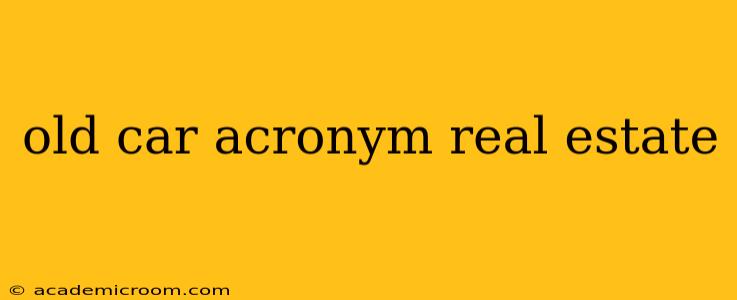The real estate world is full of jargon, and sometimes, a seemingly innocuous phrase can conceal valuable insights. One such phrase is "old car," an acronym used by savvy investors to identify properties with significant potential but often overlooked by the average buyer. This article will break down the meaning of "old car" in real estate, explore its implications, and guide you on how to spot these hidden gems.
While there isn't an officially recognized "old car" acronym in widespread real estate literature, the term is used colloquially within certain investor circles to describe properties that require significant work but offer substantial returns. It's a shorthand way of describing properties possessing characteristics similar to an old car: they might need repairs, have cosmetic flaws, and potentially require substantial investment, but with the right approach, they can be transformed into valuable assets.
What Does "Old Car" Really Mean in Real Estate?
The "old car" acronym in real estate generally refers to properties that are:
- Older: These are often properties built several decades ago, potentially requiring updates to meet modern standards of comfort and energy efficiency.
- Cosmetically Challenged: They may have outdated fixtures, worn-out flooring, or require extensive painting and general cosmetic repairs.
- Requiring Repairs: Beyond cosmetic issues, they might need significant structural repairs, plumbing upgrades, or electrical work.
- Below Market Value: Due to their condition and required renovations, they are usually priced lower than comparable properties in better condition.
What are the Benefits of Investing in "Old Car" Properties?
Despite the initial investment required, "old car" properties offer several attractive benefits:
- Potential for High Return on Investment (ROI): By investing in renovations and upgrades, you can dramatically increase the property's value and reap substantial profits.
- Forced Equity: The difference between the purchase price and the post-renovation value creates instant equity.
- Control over the Renovation: You have complete control over the materials, finishes, and overall quality of the renovations, tailoring the property to your vision and target market.
- Unique Opportunities: These properties often offer unique architectural details or large lots that are rare in newer developments.
How to Identify "Old Car" Properties?
Identifying "old car" properties requires careful research and due diligence:
- Attend Auctions and Foreclosure Sales: These events often feature properties needing significant work, often at discounted prices.
- Network with Real Estate Professionals: Experienced realtors and property managers can point you towards properties suitable for renovation.
- Utilize Online Real Estate Portals: Filter your searches by price and property age, focusing on properties significantly below market value.
- Drive Around Your Target Neighborhoods: Look for properties that appear neglected or in need of repairs.
What are the Risks Involved in Investing in "Old Car" Properties?
While the potential rewards are high, investing in "old car" properties does carry risks:
- Unexpected Repair Costs: Unforeseen issues during renovations can significantly inflate the budget.
- Time Commitment: Renovations can be time-consuming, delaying your return on investment.
- Permitting and Regulatory Hurdles: Securing the necessary permits and complying with building codes can be complex and costly.
Are there any other acronyms used in real estate similar to "old car"?
While "old car" isn't a formally recognized acronym, the real estate industry uses many other acronyms and abbreviations. Many are location-specific or relate to specific property types. Understanding these terms is crucial for successful navigating the real estate market. There isn't a direct equivalent to "old car," but terms like "fixer-upper" or "handyman special" convey a similar meaning.
How can I find properties that would fit the "old car" profile?
Finding "old car" properties requires a proactive approach. Online real estate portals allow you to filter by price and property age, highlighting potentially undervalued properties. Networking with local real estate agents and attending auctions or foreclosure sales can also uncover hidden opportunities. Remember to always conduct thorough due diligence before committing to any purchase.
What is the best way to estimate renovation costs for an "old car" property?
Accurately estimating renovation costs is crucial. It involves obtaining multiple bids from contractors, thoroughly inspecting the property for hidden problems, and factoring in potential delays and unforeseen expenses. Using a professional cost estimator can help ensure a more accurate budget.
This article serves as a general guide. Before making any investment decisions, always consult with experienced real estate professionals and conduct thorough due diligence. The "old car" strategy can be highly profitable, but requires careful planning and execution.
